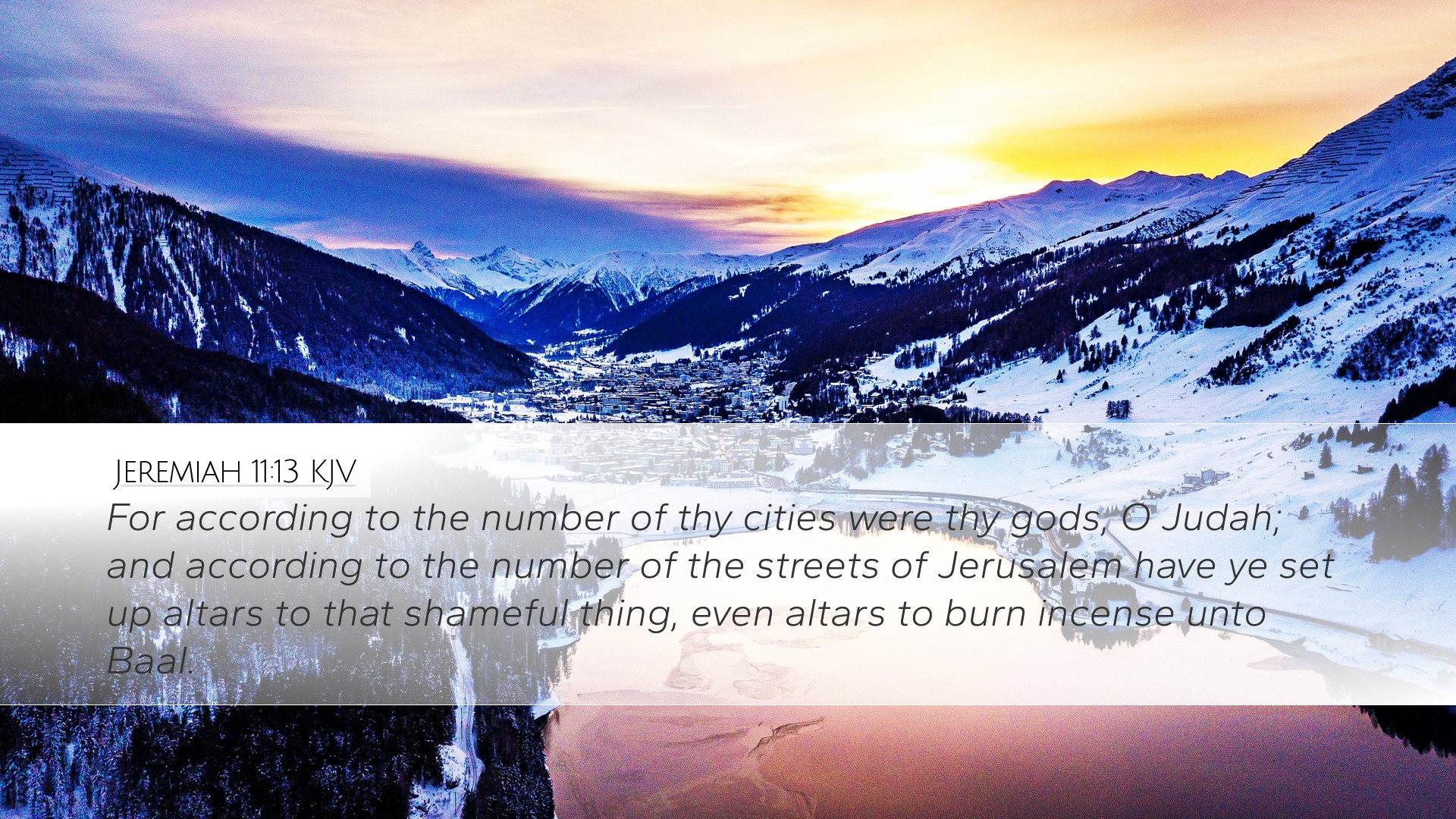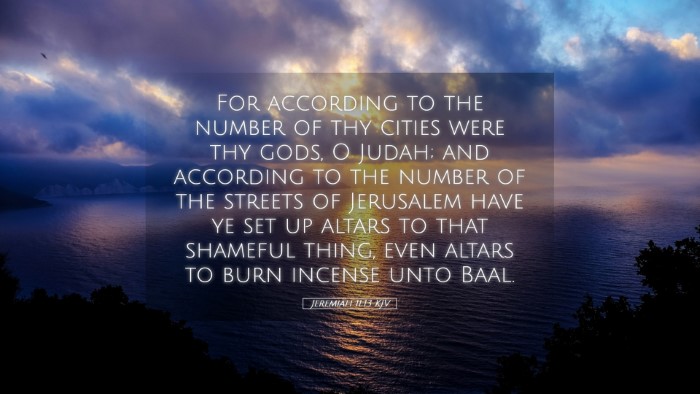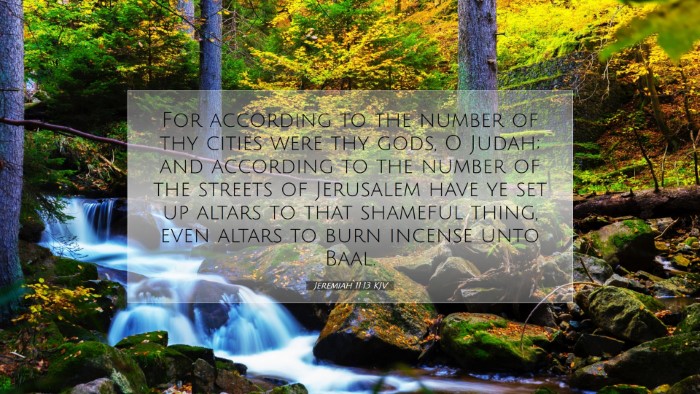Commentary on Jeremiah 11:13
Bible Verse: "For according to the number of your cities were your gods, O Judah; and according to the number of the streets of Jerusalem have ye set up altars to that shameful thing, even altars to burn incense unto Baal." (Jeremiah 11:13)
Introduction
This passage from the Book of Jeremiah serves as a poignant reminder of the spiritual state of Judah during the prophet's ministry. The verse succinctly addresses the issue of idolatry that had permeated the lives of the people. This commentary aims to delve into the implications of this verse as presented by prominent public domain Biblical scholars such as Matthew Henry, Albert Barnes, and Adam Clarke.
The Context of Jeremiah's Prophetic Ministry
Jeremiah's prophetic word came at a time when idolatry was rampant among the people of Judah. The nation had divided loyalties, worshipping both the God of Israel and the foreign deities, particularly Baal. The reference to "the number of your cities" illustrates the pervasive nature of idolatry—every city held its own god. This infidelity highlighted a grave rejection of Yahweh, the covenant God.
Insights from Matthew Henry
Matthew Henry emphasizes that this verse starkly illustrates the folly of Judah’s actions. He notes that the people, in their desire to appease their own desires and fears, multiplied their deities, thereby undermining the singular worship due to the Almighty. According to Henry, the “altars to burn incense unto Baal” denote a direct affront to God’s glory and an inability to recognize the true nature of divine worship. He summarizes that the multitude of altars ultimately reflects a heart turned away from God’s exclusive covenant.
Insights from Albert Barnes
Albert Barnes provides a comprehensive analysis of the social and religious implications of the actions described in the verse. He points out that each city’s god was a reflection of individualism and personal preference in worship, which directly contradicts the communal nature of worship ordained by God. Barnes elaborates on the phrase "the shameful thing," asserting that the worship of Baal was not merely a social inconvenience but an act laden with moral and spiritual shame. The altars signify not just places of idolatrous worship but locations where the people's hearts wandered away from the covenant they had with Yahweh.
Insights from Adam Clarke
Adam Clarke offers a deeply theological interpretation, connecting the cultural practices of the time with the historical backdrop of Israel's covenant relationship with God. He highlights the fact that the “altars” were erected in the very streets of Jerusalem, indicating that idolatry wasn’t hidden but rather was made public and socially acceptable. Clarke notes that this was a severe departure from the practices established in the Law, emphasizing that the omnipresent worship of false gods revealed a heart crisis among the Israelites. He suggests that such behavior incited divine judgment and a call to repentance, underscoring that a nation’s prosperity is often tied to its fidelity to God.
Theological Implications
- Idolatry and Apostasy: This verse serves as a striking reminder of how quickly a people can stray from true worship. The multiplication of altars signifies a heart that seeks fulfillment in created things rather than the Creator.
- God’s Jealousy: The verse illustrates God’s jealousy for His people. The exclusive nature of God’s covenant demands loyalty and reflects His character, which does not tolerate rivals.
- Covenant Faithfulness: The mention of cities and streets underscores the extent of the covenant unfaithfulness. The elevation of false gods directly correlates with the people’s neglect of God’s commandments.
- The Consequences of Sin: This passage foreshadows the eventual consequences of idolatry, including judgment and exile, which Jeremiah prophetically warns against. It is both a reminder and a warning for contemporary believers about the dangers of compromise.
Application for Modern Believers
The admonitions derived from Jeremiah 11:13 are highly relevant for Christians today. In a culture that often promotes pluralism and relativism in worship, believers must guard against the encroachment of “altars” in their own lives—spiritual distractions that detract from God’s glory and His rightful place in their hearts. This verse invites reflection on the nature of one's worship and the importance of recommitting oneself to the exclusive worship of Yahweh.
Conclusion
In conclusion, Jeremiah 11:13 encapsulates the spiritual malaise of Judah, presenting a potent calling for vigilance against idolatry. The insights provided by Matthew Henry, Albert Barnes, and Adam Clarke enrich our understanding of this passage and compel believers to examine their own lives in the light of the truth of God's word. As pastors, students, theologians, and scholars, let us heed the warnings within this text and strive for a pure and devoted worship of the living God.


